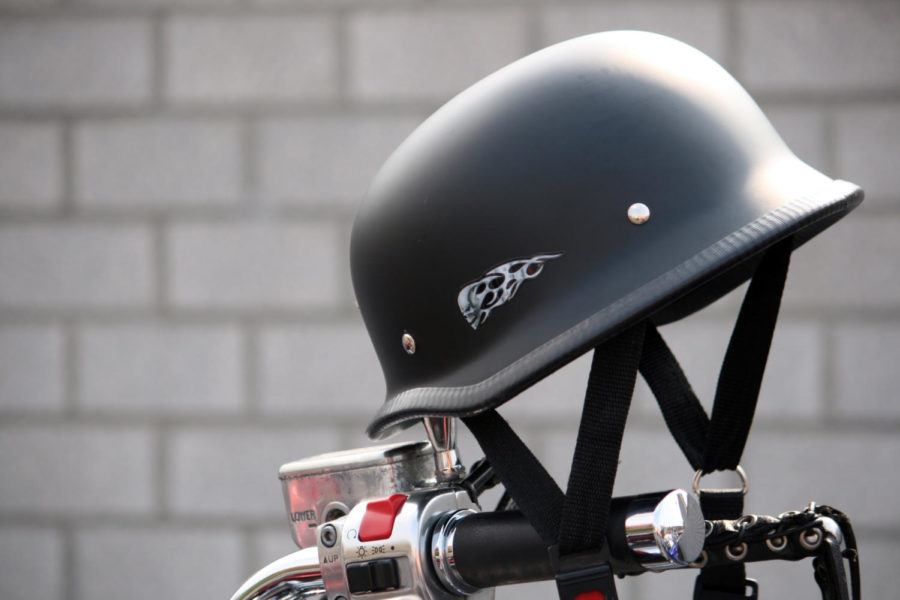Garcia-Merritt: Your helmet could be your head’s best friend
Photo courtesy of Flickr/Alesa Dam
Opinion: Garcia 11/5
November 6, 2012
Helmets can save lives. They could save yours.
I remember a phrase my high school driver’s education teacher had about unhelmeted motorcyclists: “Do you know what I call a motorcyclist without a helmet?” — pause for effect — “An organ donor.” This dark joke of sorts stuck with me, and I have been seeing quite a few “organ donors” lately. I have noticed recently, to my surprise and dismay, the number of people who don’t wear helmets while on bicycles or motorcycles around Iowa State and Ames seems quite high, especially when compared to my native Arizona.
Why people don’t wear helmets is pretty easy for me to understand; after all, I didn’t wear a helmet when I went biking until I got to Ames. Helmets can make the wearer feel sweaty and hot, uncomfortable or claustrophobic. They can also save the wearer’s life, or keep him or her from severe injury.
Trauma to the head has severe and long-lasting consequences to the victim. Impaired cognitive ability, difference of sensation or difficulty with speech are just a couple examples that can severely affect a person’s life as a result of traumatic brain injury. Wearing a helmet is important because it minimizes the risk of traumatic injury or death.
According to the Centers for Disease Control, motorcycle-related fatalities have increased by 55 percent during the past 12 years; in the year 2010 alone, 4,309 people died in the United States as a consequence of motorcycle crashes.
Iowa and Illinois are the only two states that do not have any sort of motorcycle helmet laws, and Iowa has no system of fines that is used to police any sort of helmet-related legislation.
So why isn’t there legislation to support rider protection by requiring helmets? There are arguments against mandatory laws from certain segments of the motorcyclist community, arguing that helmets, while beneficial to safety, do not actually provide that much of an increase in safety, especially for motorists at highway speeds.
I find this kind of argument to be somewhat flawed; it ignores the recognized benefits of helmet wearing, and stands in the face of existing literature that supports the safety of helmets. The Insurance Institute for Highway Safety points out that unhelmeted riders are three times more likely than helmeted riders to suffer traumatic brain injury. The CDC also points out that helmets are estimated to prevent 37 percent of fatalities for riders and 41 percent of fatalities in passengers.
Doesn’t it stand to reason that taking precautions on a metal machine traveling at high speeds would be something instinctive? Apparently not to everyone.
Yet the machine doesn’t even have to be traveling at a high speed to cause injury. Bicyclists are everywhere in a college town, particularly on campus. Yet, there is a sense of reticence about wearing helmets on bikes; this I can understand. After all, they mess up your hair; they make you feel hot and sweaty if worn for prolonged periods of time; they’re bulky to carry around while not riding; and they can make the wearer feel self-conscious about their image.
Yet, wearing a bicycle helmet might be even more crucial than a motorcycle helmet; lower speeds and less visibility on the roads mean that bicyclists are more likely to be involved in an accident with a motor vehicle with lethal consequences than a motorcyclist.
The Insurance Institute for Highway Safety has a study comparing fatal accidents between helmet wearers and nonhelmeted riders, and the results are quite astounding. In 2009, the most recent year that data was compiled for, helmeted riders accounted for only 8 percent of all bicycle collision fatalities, while unhelmeted riders accounted for 91 percent.
So, doesn’t it make sense to wear helmets? To me at least, it does. My hair might be a bit unruly, and it’s a bit of a pain to carry my bike helmet with me around, but I’d rather have messy hair than a messy head. And so I wear a nice blue helmet, even if it makes me look a bit silly.







